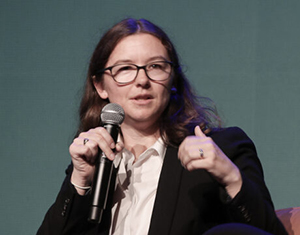Women’s conference addresses gender confusion
NEW ORLEANS (BP)—Heather began addressing her same-sex attraction after accepting Jesus in college.
“As a new Christian, she started wrestling with what the Bible says about sexuality, and she revealed her own attraction and struggles of attraction to the same sex,” women’s ministry leader Katie McCoy said.

“And when she shared her struggles to a group of other Christians, she really just needed somebody to care, somebody to walk alongside of her, someone to help her understand and grow in God’s liberating truth and grace.
“Her community of Christian friends didn’t really know what to do.”
McCoy, director of women’s ministry for the Baptist General Convention of Texas, spoke to the Pastors’ Wives and Women’s Conference June 12 in advance of the 2023 Southern Baptist Convention Annual Meeting at the Ernest N. Morial Convention Center in New Orleans.
“In her vulnerability,” McCoy said of Heather, “she stumbled into the influence and acceptance of the LGBTQ community. The underlying issues of her self-perception and her sexual attraction went unaddressed.”
Heather’s mental health suffered as she declared herself a lesbian, had her breasts removed and took testosterone supplements.
McCoy was referencing Heather Skriba, who has shared her story publicly.
“She was, in her own words, ‘trying to modify my body to deal with soul-level heartache,’” McCoy said. “And in a short span of time, she had transitioned to living as a man. But here’s the miracle of the story.
“God had not given up on Heather, because months after her procedure, she realized that her pain was beyond the reach of a surgeon. She felt the connection of the Holy Spirit, that she was settling for her brokenness when her God offered wholeness.”
McCoy was among a team of women leaders who addressed the conference, focusing on gender confusion, marriage, singleness and the trappings of a postmodern culture.
Ministry in a challenging and changing culture
Speakers offered tips on ministering amid a changing culture that promotes lifestyles that were once unacceptable, rearing and mentoring children in the postmodern world, and developing resilience as God molds and changes your life.
Rachel Gilson, a Christian wife and mother with a background of same-sex attraction, offered tips to parents and leaders on sharing biblical truth with those struggling with same-sex attraction, gender confusion and related issues.

She serves on the ministry team of Cru—formerly Campus Crusade—helping train Cru missionaries to minister to those struggling with LGBTQ-related issues.
It’s important for parents to discuss such issues with their children, and for Christians to spread the truth among their neighbors, Gilson said, serving on a panel with others and also delivering an individual address.
“I’m not saying we need to have a full-blown sex talk with our kids at like 3 years old,” Gilson said on the panel. “But I do think that because they are getting targeted messages younger and younger, we do need to think about what are some age-appropriate ways—younger than I maybe thought before—that I can be sharing good news about what God says about our bodies.”
Gilson suggests parents tell children they can trust their bodies and that marriage can be a gospel picture as painted in Ephesians 5.
“Feelings do go all over the place and some of these feelings are deep, these feelings are troubling, but we can trust our bodies. They don’t lie to us because God gave them to us. They’re good,” Gilson has told her own daughter.
Gilson acknowledged biologically intersex conditions in some children, referencing two she’s aware of.
“But if we just keep giving good, positive, scriptural things (to children), it helps set a buffer against crazy messages, confusing messages that they hear outside,” she said.
Listen before speaking
When children confess a confusion over their true gender, Gilson said, parents would be wise first to listen and express love before presenting biblical truth.
“The most important thing you can do in that moment is thank them for sharing that with you and express that you love them,” Gilson said. “Most kids in this category, they’ve been holding this inside for a long, long time.
“And if they know you, they know what you think about the Bible. They’re not confused about what you think the Bible says, but they’re deeply terrified about whether you’re going to reject them or hate them, or maybe that God is going to reject them or hate them because of something that they’re feeling or experiencing,” Gilson said.
“So the first conversation, you just want to thank them, listen to them, love them, give them a hug, show them that you care.”
A child’s disclosure to a parent is often the end of a difficult journey and a time of relief, while it’s the beginning of a different journey for parents. Gilson advised parents to seek support from trusted, loving friends to process the range of emotions they likely will experience after a child admits such a struggle.
“You might be feeling a lot of legitimate emotions, a ton of other things coming up, maybe your own fear,” she said. “And that’s perfectly normal and OK.
“But you need to make sure you have a safe place that isn’t your child to process those things with, women who love you and love Jesus, who you can go to and talk about, because the relationship with your child is so unique and so tender, that you need to make sure you have the support you absolutely need to be able to engage with them well, to speak God’s truth and God’s grace to them.”
Panels explore how to discuss sexuality with children
Panel moderator Jacki King, a Bible teacher and author, said parents need to be a safe place for their children to discuss their feelings and learn the truth of God’s design for sexuality.
In an individual address following the panel discussion, Gilson used Jesus’ encounter with the woman at the well in John 4 to examine ways to share gospel truth with neighbors.
While Jesus confronted the woman directly regarding her lifestyle and worship, Gilson said, Jesus also offered grace by going out of his way to encounter her, presented himself as vulnerable by asking the woman for a drink of water, and offered the grace of truth in salvation.
“We did not deserve Christ’s proximity when he came into the world to be born in human flesh. Proximity is grace,” she said. “And if we are going to see God save people out of this insanity, we have to choose the grace of proximity.
“By the power of the Spirit, we actually have to go. How are people going to believe if they haven’t heard and how are they going to believe if we’re not going?”
Other members of the panel, McCoy and Jess Archer, executive director and treasurer for the South Carolina Baptist Convention Woman’s Missionary Union, discussed singleness, marriage and cultural diversity in God’s body of believers. Both McCoy and Archer are single, and Archer addressed diversity from her viewpoint as an African American, the first to hold her current WMU post.
God “created us with beauty and diversity, and we can celebrate those things,” Archer said. “As women of color, we’ve always had to rely on the Lord to strengthen our faith. We’ve always had to call on the Lord to bring us through different things.
“Being that we’re in a fallen world, we know the history of slavery. We know the history of Jim Crow and oppression, and … segregation,” she said.
“But to learn how the Lord is faithful, the Lord has brought us through many things, and to see what the Lord’s going to do. Many of us are different, some of our views seem to be different, but we can always count on the Lord in what he can do.”
Regarding singleness, Archer pointed out both married and single women are daughters of King Jesus and are complete in that position.
McCoy, while acknowledging those with the gift of singleness need to be celebrated, termed marriage the “norm,” and encouraged church members to be matchmakers as well as affirmed her desire for marriage.
At other points in the three-hour event, Bible teacher, author and ministry leader Donna Gaines of Cordova, Tenn., led attendees in extended times of focused prayer both individually and in small groups.
Among Gaines’ emphases were unity over division, and the personal and corporate benefits of fulfilling God’s Great Commandment—to love the Lord with all our heart, mind, soul and strength, and to love neighbors as ourselves.
Kathy Litton, the North American Mission Board’s director of church-planter spouse development, exhorted women in developing resilience in life and in ministry.
Using Joseph Jacob’s son as an example, she encouraged women to embrace change, to accept and yield to God’s plans for their lives, to walk by faith instead of sight, and to continue to build new relationships when God sets your life on an unexpected trajectory.
“Where has God called you,” Litton asked, “to step forward out of a difficult [situation] or a loss, or failure, to move forward with a resilient life, a changed perspective of how God wants to use you? I pray that he showed you that this morning.”